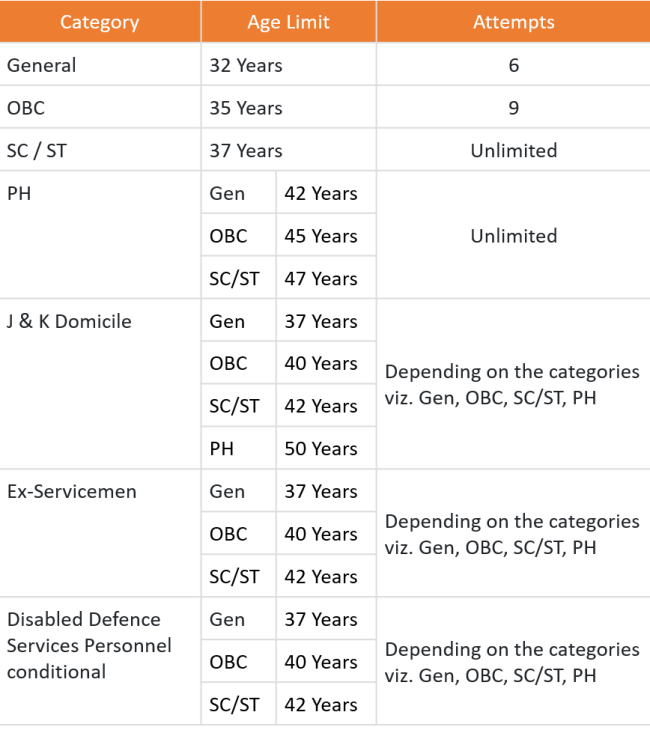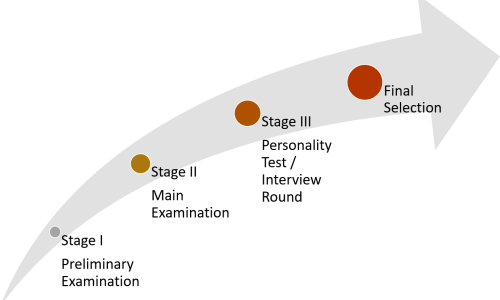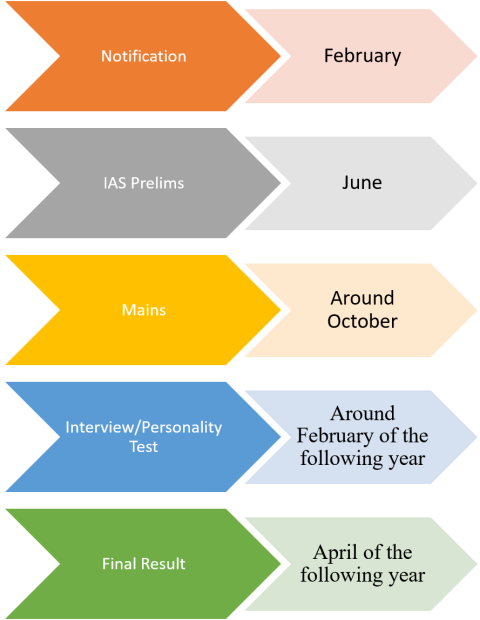Union Public Service Comission
Academic Eligibility to Appear in IAS Exam
Candidates who aspire to become IAS Officers and wish to apply for the UPSC Civil Services Exam should ensure that they fulfil at least one of the following education qualification criteria:
- A degree from any of the universities integrated by an Act of the Central or State Legislature in India
- A degree from any other educational institutions recognized by an Act of Parliament
- A degree or an equivalent qualification from any Deemed University under the UGC Act, 1956
- A degree through correspondence or distance education
- A degree from an open university
- A qualification equivalent to one of the above which is recognized by the Government of India
Candidates who meet the below mentioned education criteria can also take the civil services exam, but they should submit the proof of eligibility from an authority of their university or institution before the UPSC Mains Exam. Candidates failing to submit the proof may not be allowed to take the exam:
- Candidates who have appeared in the graduation exam or relevant qualification exam or higher exams and waiting for the results can also write the UPSC Exam but they should ensure that after success in the exam they meet one of the above educational criteria.
- Candidates who have not yet completed the MBBS internship but have passed in the final exam of the MBBS degree can also appear in the UPSC CSE.
- Candidates who have passed the final exam of the Institute of Chartered Accountant of India (ICAI), ICSI, and ICWAI can also take the exam.
- Candidates who have obtained a degree from any private university with the above mentioned conditions.
- Candidates who have obtained a degree from any foreign university recognized by the Association of Indian Universities
Eligibility Criteria For IAS Exam
- Candidates who aspire to become IAS Officers, IFS Officers or IPS Officers must be Indian citizens.
- Candidates to get into the Indian Revenue Service must meet one of the following nationality criteria as set by the UPSC guidelines:
- Citizen of India
- A person of Indian Origin who has migrated from Ethiopia, Kenya, Malawi, Myanmar, Pakistan, Sri Lanka, Tanzania, Uganda, Vietnam, Zaire, or Zambia with an intention of permanently settling in India.
- A Citizen of India.
- A Citizen of Nepal or a subject of Bhutan
- Tibetan Refugee who came to India before 1st January 1962 to settle permanently in India
- A Person of Indian Origin who has migrated from Ethiopia, Kenya, Malawi, Myanmar, Pakistan, Sri Lanka, Tanzania, Uganda, Vietnam, Zaire, or Zambia with an intention of permanently settling in India
IAS Age Limit and Number Of Attempts
A candidate should have achieved at least 21 years of age and should not have attained 32 years of age as on 1st August 2018. This is for the General Category candidates. There are relaxations for other categories which are described below:

Stages Of Exam
The Civil Services Examination (better understood as IAS Exam) is conducted by the Union Public Service Commission (UPSC) annually. The Exam consists of 3 stages:
- Stage I: Preliminary Examination
- Stage II: Main Examination
- Stage III: Personality Test/Interview Round

The stage 1 of the civil services exam is Prelims, which is a screening test for candidates and comprises of two papers with questions of objective or MCQ type
- Paper-1 (General Studies) is evaluated for merit ranking while
- Paper-2 (CSAT) is of qualifying nature.
A. Paper-1: UPSC SYLLABUS: (200 MARKS) DURATION: TWO HOURS (COUNTED FOR THE MERIT RANK IN THE PRELIMS)
- Current events of national and international importance.
- History of India and Indian National Movement.
- Indian and World Geography – Physical, Social, Economic Geography of India and the World.
- Indian Polity and Governance – Constitution, Political System, Panchayati Raj, Public Policy, Rights Issues, etc.
- Economic and Social Development Sustainable Development, Poverty, Inclusion, Demographics, Social Sector initiatives, etc.
- General issues on Environmental Ecology, Bio-diversity and Climate Change – that do not require subject specialization.
- General Science.
B. Paper-2: UPSC SYLLABUS: (200 MARKS) DURATION: TWO HOURS (NOT COUNTED FOR THE MERIT RANK IN PRELIMS BUT A QUALIFYING PAPER; JUST NEEDS 33% MARKS)
- Interpersonal skills including communication skills.
- Logical reasoning and analytical ability.
- Decision-making and problem-solving.
- General mental ability.
- Basic numeracy (numbers and their relations, orders of magnitude, etc.) (Class X level), Data interpretation (charts, graphs, tables, data sufficiency etc. – Class X level).
The stage 2 of the Civil Services Exam is called the Mains Exam, which is a written descriptive examination and comprises of 9 papers. The 9 papers are as follows:
- Paper-A (Compulsory Indian Language);
- Paper –B (English) which are qualifying in nature, while the other papers like Essay, General Studies Papers I, II, III, and IV, and Optional Papers I and II are considered for the final ranking.
QUALIFYING PAPERS – NOT COUNTED FOR FINAL RANKING:
- Paper ‐A – Indian Language . (One of the Indian Languages to be selected by the candidate from the Languages included in the Eighth Schedule to the Constitution. This paper will not be compulsory for candidates hailing from the States of Arunachal Pradesh, Manipur, Meghalaya, Mizoram, Nagaland and Sikkim.)- 300 Marks.
- Paper‐B – English Language -300 Marks.
PAPERS TO BE COUNTED FOR MERIT RANKING:
- Essay – 250 Marks.
- General Studies – I – 250Marks. (Indian Heritage and Culture, History and Geography of the World and Society).
- General Studies –II – 250 Marks. (Governance, Constitution, Polity, Social Justice and International relations).
- General Studies –III – 250 Marks. (Technology, Economic Development, Bio‐diversity, Environment, Security and Disaster Management).
- General Studies –IV – 250 Marks. (Ethics, Integrity and Aptitude).
- Optional Subject – Paper 1 – 250 Marks.
- Optional Subject – Paper 2 – 250 Marks.
Candidates who clear the Civil Services Mains Exam with the required cutoff marks will qualify for the final stage of the exam i.e., the Personality Test or Interview round with the UPSC Board Members. Marks, thus obtained by the candidates in the Mains Examination as well as the marks obtained in Interview would determine their final ranking. The object of the interview is to assess the personal suitability of the candidate for a career in Public Service by a Board of competent and unbiased observers. The test is intended to judge the mental calibre of a candidate.
The timeline of events for the Civil Services Examination (CSE).




